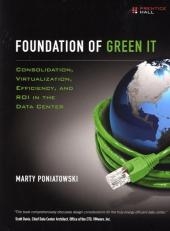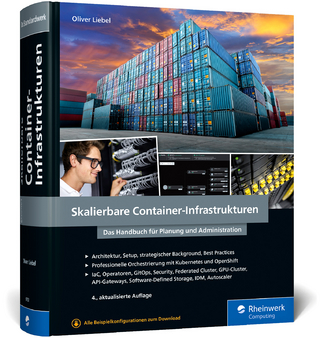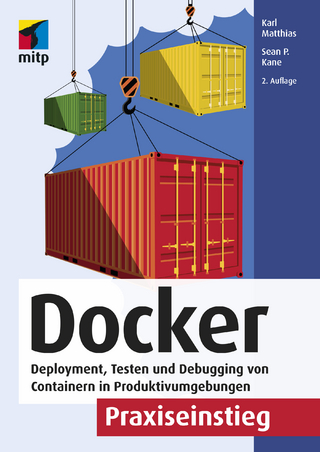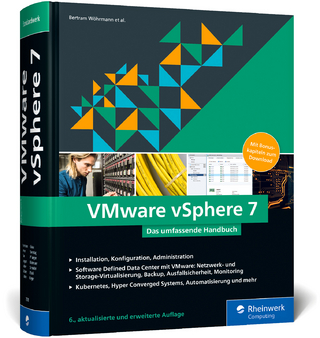
Foundation of Green IT
Prentice Hall (Verlag)
978-0-13-704375-0 (ISBN)
- Titel ist leider vergriffen;
keine Neuauflage - Artikel merken
Scott Davis, Chief Data Center Architect, Office of the CTO, VMware, Inc.
This Book Isn’t About “Evangelizing” Green It:
It’s About Getting Down in the Trenches and Making It Work
In Foundations of Green IT, a team of leading Green IT consultants presents the detailed technical information data center professionals need to systematically identify the right improvements, implement them, maximize savings, and accurately calculate business value.
Marty Poniatowski and his team present comprehensive case studies reflecting their unsurpassed Green IT experience, complete with detailed implementation diagrams and performance information. You’ll find independent, detailed coverage of solutions from HP, VMware, EMC, Cisco, and other leading vendors, with optimized sample designs and realistic ROI projections. Whether you’re a CIO or IT director, architect or administrator, if you want to improve IT efficiency, this is your definitive resource.
Three comprehensive, start-to-finish case studies
Analyze current environments, set goals, define implementation plans, and calculate ROI for:
• Server and desktop consolidation and virtualization
• Data center backup/recovery/archiving, including replication
• Networking, including VoIP background
Plus practical coverage of these Green IT topics:
• Designing data centers for greater efficiency and lower power usage
• Leveraging cloud computing
• Consolidating Microsoft SQL Server instances
• Reducing PC-related power usage and waste
About CDI, the company behind this book:
This book was written collaboratively by many CDI technical experts, led by Marty Poniatowski. CDI is an infrastructure services firm with practices focusing on virtualization, storage, networking, data center design, and other ”green” services. It has clients in all industries, notably financial services, pharmaceuticals, and healthcare.
Marty Poniatowski is the Chief Technology Officer managing all pre-sales and consulting technical experts at Computer Design and Integration LLC. Marty leads the Professional Services Group, which includes numerous practices that perform project-related consulting as well as staff augmentation. The pre-sales team of experts craft complex solutions for customers using the latest available technologies. Marty is responsible not only for the teams he manages but also keeping abreast of all industry trends and technologies. Foundations of Green IT: Consolidation, Virtualization, Efficiency, and ROI in the Data Center was written in conjunction with many members of Marty’s technical staff. This book covers all key technologies that CDI implements in client environments, including many key assessments that result in a quick ROI. Prior to joining CDI, Marty was a Principal Solution Architect and a published author with Hewlett-Packard Company for 20 years in the New York area. He has worked with hundreds of Hewlett-Packard customers in media and entertainment, consulting services, Internet startups, and manufacturing. Marty began his career as an Electrical Design Engineer on military computer systems at United Technologies Corporation. He performed numerous designs in this position, including his first chip-level design. Before joining HP, Marty was the manager of a design group at startup Canaan Computer Corporation. Marty performed chip and board level computer design and managed the design group in this position. Marty has been widely published in computer industry trade publications, including over 50 articles on various computer-related topics. He is also the author of 16 Prentice-Hall and one self-published book on computer- related topics. Marty holds an M.S. in Information Systems from New York University (NYU) Polytechnic Institute (NY, NY), an M.S. in Management from the University of Bridgeport (Bridgeport, CT), and a B.S. in Electrical Engineering from Roger Williams University (Bristly, RI).
Foreword xiii
Preface xv
What This Book Covers xvii
About the Author xxi
Acknowledgments xxii
INTRODUCTION TO PART I 2
Chapter 1 The Existing Server Environment: "The Old Way" 3
Virtualization Considerations 3
Non-Virtualized Server Example 4
Power and Cooling 6
HP Power and Cooling Calculator 8
Power and Cooling Estimate for Existing Servers 11
Explanation of Some Power and Cooling Factors 12
Virtualization Background 13
Summary 17
Chapter 2 Existing Server Environment Analysis with Capacity Planner 19
Snapshot of Servers 20
Recommended Target Platform 22
Summary of Existing Servers 22
Processor Utilization Report 28
Detailed System Server Report 29
Summary 30
Chapter 3 The Virtualized Server Environment 31
The New Server Environment 31
Assumptions 38
Blades Background 39
Performance Analysis After Virtualization 44
Summary 46
Chapter 4 Server ROI Analysis 49
TCO for Existing and New Virtualized Environments 50
Summary 55
Chapter 5 Virtual Server Implementation Plan 57
Blade Startup Implementation 58
Shared Storage Startup Implementation 59
VMware Startup Implementation 60
Data Replication Startup Implementation 62
VMware Site Recovery Manager Startup Implementation 63
Virtual Desktop With VMware View Startup Implementation 64
Summary 64
Chapter 6 Desktop Virtualization 65
Desktop Virtualization Benefits Users and IT 66
Benefits of Desktop Virtualization 67
VMware View Components 68
Desktop Management 70
Desktop Virtualization Storage 72
Desktop Application Encapsulation 74
Desktop Access 75
Virtual Printing 75
Check In and Check Out of the Virtual Desktop 76
Desktop Virtualization TCO and ROI 78
Dedicated Workstation Blades 79
Benefits and Components of Workstation Blades 81
Summary 83
INTRODUCTION TO PART II 86
Chapter 7 The Existing Backup and Recovery Environment 87
Existing Backup and Recovery Solution 87
Data De-Duplication 91
Archive 92
General Backup Considerations 94
Media 94
Full Versus Incremental Backup 94
Clone Versus Replication of Data 95
Backup and Recovery Versus Disaster Recovery 95
Distributed Backup Versus Centralized Backup 96
Summary 97
Chapter 8 Existing Backup and Recovery Analysis with Backup Assessment 99
Snapshot of Backup Servers 100
Backup Client Capacity 103
Backup and Restore Job Summary 104
Recommendations for Improving the Environment 107
Summary 109
Chapter 9 The Enhanced Backup and Recovery Solution 111
New Disk Library Backup and Recovery Environment 112
Alternative New Backup and Recovery Environment 114
Disk Library Operation 117
Virtual Disk Library and Backup Software Implementation 125
Summary 129
Chapter 10 Backup, Recovery, and Archive ROI Analysis 131
TCO Summary for the New Environment 132
Five-Year Benefit Summary 133
Investment Summary 137
Return on Investment (ROI) Summary 137
Summary 140
Chapter 11 Data Replication and Disk Technology Advancements 141
Data Replication Methods 141
Fabric-Based Replication 142
Host-Based Replication 144
Array-Based Replication 145
Disk Technology Advancements 147
Disk Characteristics 148
Disk Calculation Method 149
Flash Disk Technology 150
Total Cost of Ownership Advantages of Flash Disk 152
Sample Flash Versus Fibre Channel Disk TCO Analysis 154
Summary 156
INTRODUCTION TO PART III 158
Chapter 12 The Existing Network Environment with Enhancements 159
Existing Network Environment Example 159
Upgrades to the Large and Small Existing Closets 161
Overview of Common Network Components 168
Cisco Operating System Overview 171
Cisco EnergyWise Technology 174
Summary 175
Chapter 13 Existing Network Analysis with Discovery 177
Cisco Discovery Prerequisites Overview 178
Discovery Executive Summary 179
Discovery Detailed Reports 185
Software Life Cycle Legend 185
IOS Detailed Report: Software, Hardware, and Security 188
Summary 193
Chapter 14 Voice over Internet Protocol (VoIP) 195
Telecommunications Overview 195
How Does VoIP Work? 196
How VoIP Is Different from a Traditional Phone System 199
VoIP, Green, and Cost Savings 203
Audio Conferencing 203
Video over IP 204
Data Center Consolidation 205
Private Networking 208
Maintenance Support Optimization 209
Service Contract Optimization 210
What’s Next for VoIP? 210
Summary 211
INTRODUCTION TO PART IV 214
Chapter 15 SQL Server Consolidation to Achieve Green Results 215
Opportunities 216
Initial Situation 217
Desired Situation 218
Solution Approach 218
Solution Implementation 225
Results 230
Summary 233
Resources 234
Chapter 16 The Green Data Center 237
Traditional Data Center 237
Rack and Air Flow History 240
High Density Racks 245
Green Data Center 248
Unstructured Data Cabling 249
Structured Data Cabling 250
Future of Data Cabling 250
Power Cabling 251
Summary 255
Chapter 17 Cloud Computing 257
Private Cloud Considerations 258
The Public Cloud 259
Sampling of Public Cloud Providers 262
Backup in the Cloud 266
Storage in the Cloud 269
Other Cloud Applications 270
Why Go to the Cloud? 271
Governance in the Cloud 272
Cautionary Note on Data Portability 273
Summary 273
Chapter 18 Simple Power Savings and Other Green Tips 275
Turn Off Your Desktop Computer 276
Some Interesting Facts 277
Some Tips for Saving Energy 277
Activate Desktop Computer Power Management to Save Energy 278
They’re On Even When They’re Off 282
Recycling Electronic Waste 283
Background on Electronic Waste 284
Green Printing 286
Summary 287
Chapter 19 Managed Services: Remote Monitoring 289
Executive Overview 290
Detailed Hardware Inventory 294
Detailed Software Inventory 298
Site Inventory 300
Site Health 303
Windows Server Health 305
Underlying Tool 307
Summary 308
Index 309
| Erscheint lt. Verlag | 27.8.2009 |
|---|---|
| Verlagsort | Upper Saddle River |
| Sprache | englisch |
| Maße | 179 x 234 mm |
| Gewicht | 570 g |
| Themenwelt | Informatik ► Betriebssysteme / Server ► Virtualisierung |
| Mathematik / Informatik ► Informatik ► Theorie / Studium | |
| ISBN-10 | 0-13-704375-9 / 0137043759 |
| ISBN-13 | 978-0-13-704375-0 / 9780137043750 |
| Zustand | Neuware |
| Haben Sie eine Frage zum Produkt? |
aus dem Bereich


